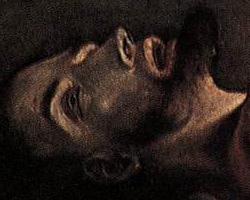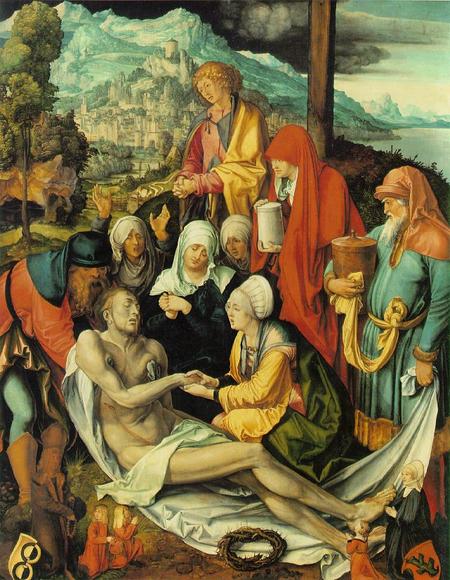February 02, 2005
HOLLOW MEN

Nietzsche: "'Real are we entirely, and without belief or superstition.' Thus you stick out your chests - but alas, they are hollow!'"
Is there anything more tedious than attacks on religion in general and christianity specifically?
One of the most refreshing aspects of Zizek and Badiou is their unashamed reclamation of aspects of the Christian legacy.
The relation of both to Christianity is different. The scandal of Badiou's reading of St Paul is that it relegates Christ to a figure of purely formal signifiance (he who is resurrected). Badiou admires Paul for his rigorous extirpation of the 'magician's parephenalia' and hoary rural lore of the gospels. Zizek's relation to Christianity is more ambivalent: is he a believer or not?) In any case, both are clear that Christianity, as Zizek says, is too important to be left to the 'Christians'.
If we've learned anything from Nietzsche - and the Last Men to do anything from that are the so-called atheists - it is that, we must always ask: where is a critique coming from? What is the critic asking us to value? What will expresses itself in the critique? Almost no-one notices that, in Nietzsche's parable of the death of God, it is 'many of those who did not believe in God' who sneer at the madman-prophet, smugly certain that they have transcended religious belief.
But, like Marx, Nietzsche understood that what was crucial was not the content of religious belief, but its form. Even in his nineteenth century, Christianity as content was effectively finished. Which is why most of his ire is directed not at the dead shell of the Church but at what it had metamorphosed into: the 'modern ideas' of socialism, egalitarianism and democracy which inherited and completed the task of passive nihilism begun by Christianity's slave revolt in morals.
The bleakest libidinal position of all, the attitude Nietzsche most abominated and feared, was that of perpetual critique, as practised by the Last Man. The 'Last Man' was the European at the end of history, listlessly watching 'the reel as it comes to a close', 'liberated' from the 'illusions' of any particular cultural group, and so free to choose the 'best' from all of them: a bit of zen buddishm here, a dash of steppes shamanism there, seasoned with some kabballah to taste.

Yet what remained uncritiqued in this allegedly hyper-discriminating, hyper-critical stance was the position of the chooser, he who critiques. Who or what is this individual? Why, Oedipus, at last, of course, and, as Deleuze-Guattari point out in Anti-Oedipus, the simperson of Oedipus is our equivalent of primitive tanoos and despotic icons. Oedipus, who believes in nothing but his own subject position, the empty formal space of he who does not believe.
Nietzsche made two major errors in relation to Christianity though.
The first was the one identified by John Gray in Straw Dogs. Unlike Schopenhauer, who rejected Christianity in the name of what were in effect other religious positions - Buddhism and Hinduism - Nietzsche, a little like the pantoGoth God-baiters of today, protested rather too much about his anti-Christianity and his rejection of religion. Nietzsche was the inheritor of Christianity because he believed in History as Progress. It would be the Anti-Christ ubermensch who would emerge as the redeemer.
The second was his flattening out of Christianity into One thing. The 'ascetic ideal', the miserable devotion to 'self-mutilation' is no doubt an aspect of what has been called Christianity. But from the very start, in the conflict between Peter and Paul, between them and the Gnostics, Christ's legacy has been a site of struggle.
An interesting conversation the other week with John Effay and the Dark Prince of Cold Rationalism concerned the issue of what is unique about Christianity. For John, what made Christianity a religion was its rituals: specifically, communion. But for me, what is unique about Christianity is its rejection of ritual. As John Fletcher argues in Situation Ethics, it is the ethical stance of loving others before yourself that makes you a Christian, not any commitment to symbols, rituals or supernatural beliefs. Far from belonging tp the 'monotheistic' religion of the Father-Law, Fletcher shows, Christ makes a break from 'Legalistic' conceptions of the ethical. And, as Badiou demonstrates in the St Paul book, there were many surprising affinities between Paul and the Gnostics - crucial to all of which is the differentiation of Christ's stance from that of the cruel and capricious Father-despot of the Old Testament.
The upshot of all this is would be that there are many people who call themselves Christians who are not (Kierkegaard: there are TOO MANY 'Christians') and also many people who call themselves Atheists who are in effect 'Christians'.
The issue shows up the discrepancy between belief and conviction. It is in that discrepancy that ideology does its work, i.e. (in an example close to my own heart atm), 'I don't BELIEVE that education should be dominated by league tables, but that's how it is, so we have to devote all our energy to playing the system, gerrymandering statistics etc.' Ideology does not require belief, only compliance, and if you do comply, that is your conviction, your commitment.
The challenge of religion is to live your conviction. Kierkegaard's call to a leap into faith should be taken less, as is normally done, as a demand for the subsumption of reason into the irrational, but as a call to show fidelity to your conviction. This was what Kierkegaard meant by deriding those who merely 'believed' but who lacked 'inwardness'.
To be genuinely religious is, above all then, to rise to the challenge of consistency. Which is why the Rationalist tradition in Philosophy is religious, whereas the Empiricist tradition, based in commonsense and experience, is atheistic. Hence Spinoza's flattening of ethics into geometry versus Hume's claim that the only answer to the dilemmas of Philosophy was to forget about them and play billiards. More on this soon.
Posted by mark at February 2, 2005 08:53 AM | TrackBack
